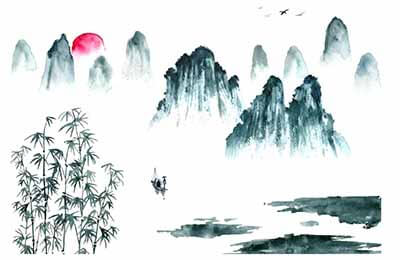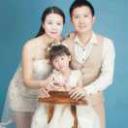我的七年中国时光
时间:2022-10-18 09:07:12

wow, how time flies! I have been in China almost seven years and in that time so much has changed in my conception of China and the Chinese people.
I was born in England about 50 years ago and grew up in a quiet north-west London suburb. In those days China could have been another planet, since our knowledge of China was very scanty. We knew about Chinese food (or thought we did), and were positive that all Chinese wore funny conical straw hats and could not pronounce the letter "r" but said "l" instead. In fact, in those days we knew more about pandas than we did about China.
Forty years (plus change) later, I went to China on a company fact-finding mission. In the intervening years I had been many places and met many different cultures. My knowledge of China had improved slightly and I now knew that not all Chinese men had pigtails and wore silk gowns. I knew that there were also such things as Sichuan cuisine and Peking Duck. However, the main China "truths" that I knew were that Chinese people ate rice with every meal, and that a traffic jam in China referred to bicycles, not to cars.
I came to China as part of a delegation to check the feasibility of a large-scale agriculture project. The pre-departure briefing was very thorough - it consisted of the following Ten Commandments:
1. You're going to Taiyuan, Shanxi - here it is on the map.
2. Only drink bottled water, and make sure the seal is still intact.
3. Don't go anywhere without a Chinese escort/interpreter since no one speaks English.
4. Don't touch/look at the local girls - it upsets the local men.
5. Don't make jokes - they cannot be translated because the cultural difference is too big.
6. Expect to eat lots of rice.
7. Don't ask what the meat is because you won't want to hear
the answer.
8. Take toilet paper and first aid kits with you.
9. Bring a present for your hosts.
10. Enjoy the trip.
With such a detailed briefing, what was there to worry about? Now we really were China experts!
So, one day in September 1998, we arrived in China for our fact-finding mission. We landed at Beijing Capital Airport to find an old, tired building that despite appearances was incredibly efficient. It was the first time in all my global travels that the bags were already on the conveyor belt before we arrived in the baggage collection hall, and not because of delays at passport control.
We were met by the local representative of the company that wished to convince us to start a China operation. He explained that there was no time to go into the city and we should wait at the airport for our connection. No problem, we would go to the airport shops and restaurants. OK, he said and so we went on our first voyage of discovery, which ended about two minutes later when we realized that there were no shops, just a few kiosks, and nowhere to sit and drink coffee.
Finally, we boarded the plane for Taiyuan. It was small and maybe of Russian origin. Once airborne, the flight attendants distributed various items, including fans. Great, what excellent service, free souvenirs - or so we thought. We quickly discovered that the fans were not just idle presents, but a necessity since the plane did not have air-conditioning.
From Taiyuan Airport we were taken to the hotel, which (I now know) was in the older and more decrepit part of the city. Our first experience of Chinese driving was at full speed and at night. We noticed that most of the cars were without headlights. Our interpreter said the drivers were saving electricity. "Hello, China," we thought, "it's a battery that's constantly being charged; what exactly are you saving?"
The area of the hotel seemed to have rarely seen foreigners, as we were always followed by cries of "laowai, kankan laowai lai le". The owner of the hotel had decided to delight our taste buds with the local delicacies - Shanxi noodles and Shanxi vinegar. During the two weeks we stayed there, we had these noodles with every meal.
The site we had to visit was about ninety minutes from the hotel. The area included several small villages with houses dug into the hills and a couple of polluted reservoirs that were used for bathing and washing by the locals, and for their animals' drinking water. Throughout the next two weeks we were driven daily, in fear of our lives, between the site and hotel. We walked up and down the hills, took soil and water samples, had cold noodles for lunch, and learned about the technological level of the Chinese farmers, the sizes of their plots and the types of crops grown locally.
We flew home as newly graduated experts on China. We now knew:
1. How to find Taiyuan on the map.
2. Only to drink bottled water, and to avoid the local alcohol "baijiu" since it tastes like petrol.
3. Don't go anywhere without a Chinese escort/interpreter - it is impossible even to find the WC by oneself.
4. Don't talk to the local men - it upsets the local women.
5. Only slapstick jokes can be translated.
6. Chinese only eat noodles.
7. Don't ask what the meat is because we know the answer.
8. Take toilet paper and first aid kits with you at all times.
9. Bring many presents for your host, his family and his friends.
10. Prepare for many return visits.
Tempus fugit - how time flies! I have now been in China nigh on seven years and have visited many places. I lived for two years in the north-east, for over a year in the north-west and for over three years here in Beijing. During that time, I have learnt much more about how things really are here. I now wander freely without an interpreter (and speak very bad Mandarin), and drive like a native. I fearlessly talk to the local women (my wife and her friends) and finally understand how much I still have to learn about China and the Chinese. Roll on the next seven years.
唉,真是时光飞逝啊!我在中国已经呆了将近7年时间了,在那段时间里,我对中国和中国人的观念已经发生了很大变化。
大约50年前,我在英格兰降生,并在伦敦西北部一个幽静的郊区长大成人。那时候,中国可能要算作是另一个星球,因为我们对中国知之甚少。我们了解中国菜(或者说是我们自认为了解),确信所有的中国人都戴着滑稽的锥顶草帽,发不出字母“r”的读音,而是以“l”来代替。实际上,我们那时候对熊猫的了解比我们对中国的了解还要多。
40余年后,我跟着公司的一个考察团来到了中国。之前的那些年间,我去过许多地方,见识了许多不同的文化。而我对中国的了解就增加了一些,那时我知道了并非所有的中国男子都留着辫子、穿着丝袍。我知道了还有川菜和北京烤鸭之类的东西。然而,我得知的关于中国的重要“事实”则是中国人每餐都吃米饭,而且交通堵塞在中国是指自行车而不是汽车。
我是作为代表团成员来中国考察一个大型农业项目的可行性的。临行前的情况通报非常全面――它包括下列“十诫”:
1. 你们将要前往山西太原――它就在地图的这个位置上。
2. 只能喝瓶装水,要确保封口仍旧是完好无损的。
3. 不要在没有中方陪同人员或翻译的情况下外出,因为(那里)没人会说英语。
4. 不要碰触或注视当地女孩――那会使当地男性感到不快。
5. 不要开玩笑――因为文化差异过大所以无法对其进行翻译。
6. 预计会吃很多米饭。
7. 不要询问肉食类型,因为答案是
你不想听到的。
8. 随身携带卫生纸和急救箱。
9. 为你的东道主带一份礼品。
10. 享受旅行的乐趣。
有了如此详细的情况通报,还有什么可担心的呢?我们那时简直就是中国通了!
就这样,1998年9月的一天,为了我们的考察任务我们来到了中国。我们降落在北京首都机场,发现大楼又老又破,外观虽是如此,但效率却是出奇地高。提包在我们来到行李认领大厅前就已放在传送带上了,这在我的全球旅行中尚属首次,倒不是因为在护照检查处有什么耽搁。
迎接我们的是公司在当地的,此人希望说服我们在中国开展业务。他解释说,没有时间到市区里逛一下了,我们要在机场等待我们的换乘班机。没问题,那我们要到机场的商店和餐厅里逛一逛。他说没问题,所以我们开始了我们的首次探索之旅,而大约两分钟之后,当我们意识到没有商店,只有几个货亭,连个坐下来喝个咖啡的地方都没有时,这次旅行便结束了。
最后,我们登上了飞往太原的飞机。飞机不大,可能是俄制的。飞起来以后,航班乘务员立即分发起了包括扇子在内的各类物品。太棒了,服务太出色了,有免费的纪念品啊――我们差不多就是这么想的。而我们很快就发现,这些扇子并非是没有用处的礼品,而是一个必备品,因为飞机上没有空调。
到了太原机场,我们被带到了酒店,而那家酒店(我现在才知道)位于比较破旧的城区。而我们对于中国人驾技的首次体验,是在全速夜行的情况下完成的。我们注意到,大部分汽车都没有开前灯。我们的翻译说,司机是在省电。“喂,中国,”我们就想了,“那是块可以不停进行充电的电池啊,你到底是在省什么呢?”
酒店所在的地区似乎很少有外国人来,因为我们身后总是会传来“老外,看看老外来了”的喊声。酒店老板决定用当地佳肴来让我们大饱口福――山西面和山西醋。在我们呆在那里的两个礼拜时间里,这种面条我们每餐都吃。
我们要参观的地点离酒店大约有90分钟的路程。在那个地方,有几个村子,房屋都是在山中开凿出来的,还有几个受到污染的水库,被当地人用作洗浴、洗涤以及其牲畜的饮水之地。在接下来的两个礼拜时间里,我们每天都提心吊胆地坐着车,往返于此地和酒店之间。我们步行上下山,采集土壤和水质样本,午饭就吃冷面条,了解到了中国农民的科技水平、其耕地的大小以及当地种植作物的类型。
我们乘机返乡时,已然成了新近毕业的中国通了。我们当时知道了:
1. 如何在地图上找到太原。
2. 只能喝瓶装水,而且要避免饮用当地的酒――“白酒”,因为它尝起来像汽油。
3. 不要在没有中国陪同人员或翻译的情况下外出――自己一个人甚至连厕所都找不着。
4. 不要跟当地男性说话――那会使当地妇女感到不快。
5. 只有粗俗的笑话可以被翻译过来。
6. 中国人只吃面条。
7. 不要询问肉食类型,因为答案我们是知道的。
8. 任何时候都要随身携带卫生纸和急救箱。
9. 为你的东道主、他的家人和他的朋友带许多礼品。
10. 为多次复访做好准备。
光阴似箭――真是时光如飞啊!我现在已经在中国呆了将近7年时间了,而且已经走访了许多地方。在东北我住了两年,在西北住了一年多,而在北京这里也住了三年多了。在那段时间里,我对于这里的真实情况有了更多的了解。现在,我四处闲逛就不需要翻译在场(而且讲着一口非常差劲的普通话),车开得跟本地人似的。跟本地妇女(我的妻子和她的朋友们)交谈,我也不怕了,而且终于明白了对中国和中国人还有多少是我需要了解的。期盼着下一个7年时光。 >> >
plus change
在文中第三段的首句当中,在括号里出现了一个词组――“plus change”,它的意思是“and a little more”。这个词组原来是跟钱有关。如,当你要告诉别人你有多少钱时,你可以说“I've got five dollars plus change”。你的言下之意是,你的钱比5美元多一点儿,但还不到6美元。而这个词组的意思后来就被延伸了,可以用到其它事物上,如你可以说“twenty miles plus change”来表达“20多英里”的意思。
scanty /`sk2nti/ adj.缺乏的;不足的
positive /`p4zitiv/ adj.肯定的;确实的
conical /`k4nik9l/ adj.圆锥形的
mission /`miH9n/ n.使团;任务
pigtail /`piG,teil/ n.辫子
gown /Gaun/ n.长袍
delegation /,deli`GeiH9n/ n.代表团
feasibility /,f1z9`bil9ti/ n.可行性
briefing /`br1fiM/ n.情况介绍
seal /s1l/ n.封条;密封
intact /in`t2kt/ adj.完整的;未动过的
escort /`esk5t/ n.陪同(人员)
first aid kit 急救箱
conveyor /k7n`vei9(r)/ n.传送带;传送装置
baggage /`b2Gi_/ n.行李
kiosk /`k14sk/ n.售货亭;报亭
board /b5d/ vt.登(船、飞机等)
flight attendant 航班乘务员
souvenir /`s6v9ni9/ n.纪念品
idle /`aidl/ adj.无用的;无价值的
decrepit /di`krepit/ adj.破旧的;老朽的
charge /tH3_/ v.充电
taste bud味蕾
delicacy /`delik9si/ n.美食;佳肴
vinegar /`viniG9/ n.醋
reservoir /`rez9vw3/ n.水库;蓄水池
plot /pl4t/ n.小块土地
petrol /`petr(9)l/ n.汽油
slapstick /`sl2pstik/ n.粗鲁的滑稽剧
tempus fugit /`tempus`f(_it/光阴似箭
mandarin /`m2nd9rin/ n.普通话
